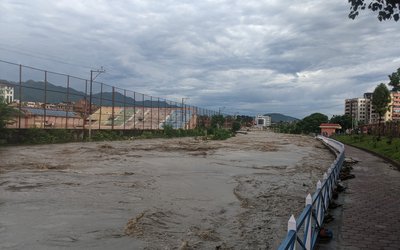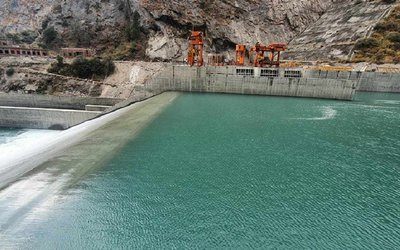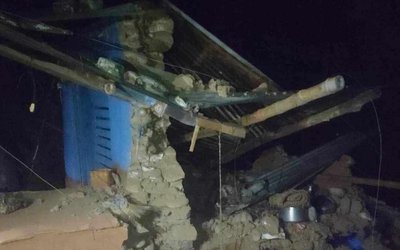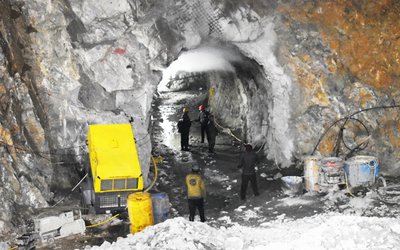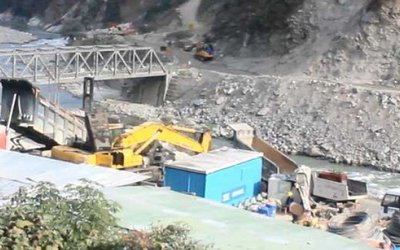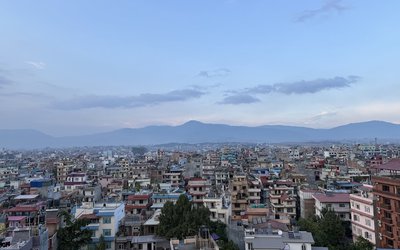
With the ground breaking of Chilime-Trishuli Transmission line, promoters of many power hydropower projects along Trishuli river, now have the reason to rejoice as this transmission line will pave the way to evacuate the energy.
The other importance of the project is that Nepal and European partners, including Germany and European Investment Bank, have joined together to construct the 220-KV double circuit transmission line.
The new 27km transmission line will be built through difficult mountainous terrains, 50km west of Kathmandu, by the Nepal Electricity Authority and financed by the European Investment Bank, the European Union through the Asian Investment Facility, German Development Bank KfW and Government of Nepal.
Along with supporting to evacuate the clean renewable energy, this project will also help to uplift the livelihood of poor people of the region.
“Expanding access to electricity will benefit rural communities and harnessing renewable energy will greatly benefit the environment as well,” said Minister of Energy, Water Resources and Irrigation Barshaman Pun.
Addressing the ground breaking ceremony of the Chilime-Trishuli transmission system in central Nepal, Minister Pun said that new transmission link will enable 600 MW of clean energy to benefit Nepal and more than 7,200 households to gain first-time reliable electricity access.
“Once complete the new Chilime-Trishuli Transmission link allows thousands of people living in communities in the Trishuli River Basin and beyond to benefit from clean hydropower energy and a more reliable power supply. This crucial energy project is key for sustainable development in Nepal and demonstrates the close partnership between Nepal and European partners.” said Minister Pun. speaking at the ceremony.
Realizing the importance of the project, Minister Pun, Kul Man Ghising, Managing Director of the Nepal Electricity Authority, Andrew McDowell, Vice President of the European Investment Bank, Veronica Cody, European Union Ambassador to Nepal and Roland Schäfer, German Ambassador to Nepal and local government and community representatives attended the ground breaking ceremony in Trishuli.
The new transmission link will enable 600 MW of clean energy generated from hydropower plants, including independent power producers, on the Trishuli River corridor to be connected to Nepal’s national electricity grid and upgrade existing electricity distribution to enable a more reliable supply of energy.
“Over the coming years, investment in clean energy will support sustainable development across Nepal and significantly increase use of renewable energy sources. The Chilime-Trishuli transmission line highlights how technical and financial cooperation between the Nepal Electricity Authority and European partners benefits our country and helps to harness low-carbon power sources,” said Kul Man Ghising, Managing Director of the Nepal Electricity Authority.
The distribution scheme under the transmission system will also enable households in remote rural communities to benefit from first time access to electricity and reduce the need for expensive generators and cooking fuels.
“Seeing at firsthand how local communities benefit from access to electricity and how communities most vulnerable to a changing climate can benefit from clean energy makes today’s groundbreaking important for both Nepal and Europe. This project demonstrates the European Investment Bank’s firm commitment to supporting climate related investment across Asia and we are pleased to provide EUR 30 million to finance construction of the Chilime-Trishuli transmission link,” said Andrew McDowell, European Investment Bank Vice President responsible for energy and South Asia.
“The European Union is pleased to support the Chilime-Trishuli project. The joint cooperation between Nepalese and European partners has enabled detailed preparation to be completed and construction to formally start today. The presence of Minister Pun, EIB Vice President and the German Ambassador reflects the high importance we give to this project and highlights our shared goals to improve energy access in Nepal,” said Ambassador Veronica Cody, Head of the European Union Delegation to Nepal.
“Support for energy is a key priority for German cooperation in Nepal. Today provides an excellent opportunity to stand alongside Nepalese friends and European partners to show how together we can support sustainable development in this country,” said Roland Schäfer, Ambassador of the Federal Republic of German to Nepal.
The European Union and German government financed comprehensive technical assistance totaling EUR 16.25 million, essential for preparation and implementation of the project and the European Investment Bank is providing a EUR 30 million long-term loan to finance construction of the new transmission link.
At a time when Nepal is promoting renewable and clean energy to support the economy, this transmission line will greatly benefit the people and Nepal’s energy sector.
- NEPAL-THAILAND: Joint Business Council
- Apr 13, 2025
- BIMSTEC SUMMIT: Nepal’s Stand
- Apr 11, 2025
- IME GROUP: Expands Into Paper Industry
- Mar 24, 2025
- CPN UML: Instigated By India
- Mar 23, 2025
- ADB’S CHIEF ECONOMIST: Nepal Reduces Poverty
- Mar 11, 2025
